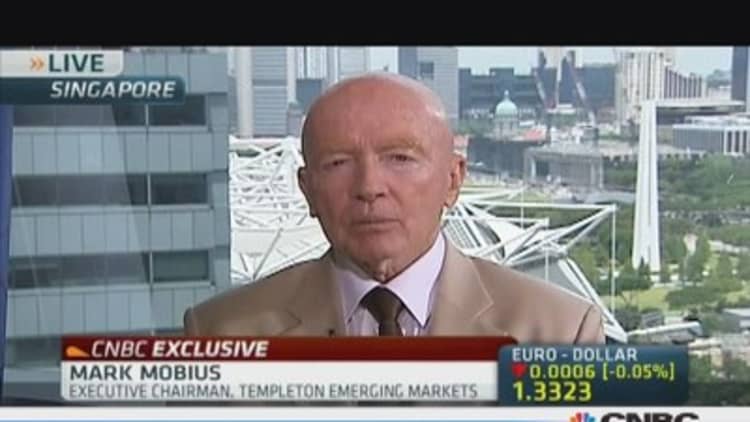
Not everyone is convinced the widely anticipated pullback in the U.S. Federal Reserve's bond buying is sounding a death knell for emerging markets.
"This fear of tapering is quite overdone," Mark Mobius executive chairman of Templeton Emerging Markets Group, told CNBC, even as shares in Indonesia dropped nearly 4 percent on Monday, and those in Thailand shed more than 2 percent. Franklin Templeton manages around $834.1 billion.
(Read more: Unlocking the playing field for emerging markets)
"What people fail to realize is that the so-called tapering is on top of an incredible increase in money supply in the U.S.," he said. "These QE programs have been cumulative. It's not a situation where one stops and all that money goes away," he said. "It stays in the system."
The U.S. central bank is widely expected to begin scaling back its $85 billion per month bond buying program, possibly as early as September, in a move likely to spur rising interest rates.
(Read more: September or December taper — does it really matter?)
"You're going to see more money going into emerging markets," Mobius predicted. He noted that while emerging market fixed income funds have seen net outflows recently, fund flows for the segment's equity funds have actually been flat.
He is positive on the Asean region, expecting the region's free trade area to offer a market equal to China's in the long term, while increasing liquidity in Japan in the wake of stimulus there will spur more fund flows into Asean.
But Mobius is less optimistic on the outlook for India, which has been suffering from capital outflows, with its currency weakening to another fresh record low of 62.35 against the dollar on Monday. He said he is concerned about the country's bureaucracy. "They're just moving too slowly," he said, adding the barriers to investment are too high.
(Read more: What's really holding back growth in India)
While he still invests in the country, "it's not at the top of the list."
Others agree the tapering concerns may be overdone. "Climbing U.S. rates in themselves are not sufficient to knock out the region's financial system and spark a crisis that many apparently fear," said Frederic Neumann, co-head of Asian economics research at HSBC, in a note.
But he added, Asia can't entirely shrug off tapering jitters. "Financial conditions have undoubtedly tightened. The result is that growth will limp along, unlikely to accelerate sharply any time soon," Neumann said.

